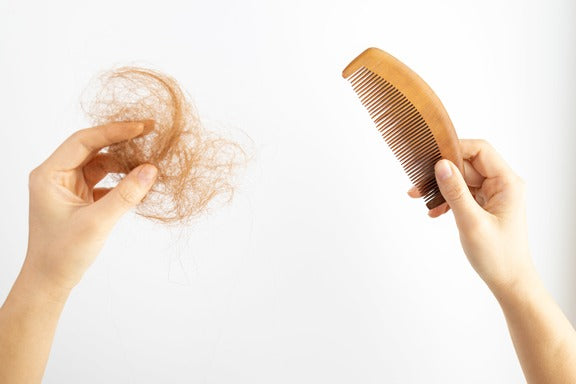Becoming a mother is the best feeling in the world. All the struggles you faced vanish in a blink of an eye as soon as you hold the small wonder created by you.
However, this happiness comes with massive changes that no one had warned you about. It means sleepless nights, endless nursing sessions, stitches, pain and, most importantly accepting your new body.
While you’re in the phase of accepting this all, you encounter another panicking change. Yes, we’re talking about the nerve-wrecking hair loss you’re experiencing right now. The hair loss is so severe that we wonder if this is ever going to stop. Well, calm down as it’s normal at this stage. Moreover, you can reduce it through simple methods that won’t require much efforts.
In this blog post, we’ll get under the hood of post-partum hair loss and how you can control it. Let’s get started!
Why does Postpartum Hair Loss Happen?
Normally, the growth of your hair occurs in cycles (growing phase, resting period, shedding phase, repeat). But during the pregnancy, your hair settles down in the growth phase due to rising estrogen and progesterone levels.
After childbirth, your hair growth cycle is between the growing and resting phases. You can see some of the baby hair on your hairline during this period and no hair fall. As soon as you complete your fourth trimester, the growth cycle moves toward the shedding phase. It makes up for the part missed during your pregnancy by shedding normal hair than usual.
This sudden increase in hair fall is termed ‘telogen effluvium.’
When to be Concerned About Postpartum Hair Loss?
Normally, shedding 80-100 strands a day is normal. But new moms shed 400 strands a day, thus clogging the shower drain in their bathroom. However, after six months, this hair fall should get back to normal.
But, if you feel your hair fall is not improving, chances are that there might be other health issues at play. Studies show that childbirth reduces the level of a blood cell protein that helps the body store iron called ferritin. This reduction in ferritin can get your thyroid out of whack and develop iron deficiency in your body.
Make sure to get the help of medical professionals if such a case persists.
How Can You Reduce the Shedding? Here are Some Preventive Measures.
Before jumping into the topic, let’s give you some good news that most mothers have returned to their normal hair growth by their baby’s first birthday.
Now let’s share with you some of the tips and tricks which would help you reduce the hair fall, if not completely stop it.
- Be Gentle
Just like your baby, be extra gentle with your hair too. Take extra care, especially while brushing, washing and styling.
- Avoid Tight Hairstyles
Avoid tight ponytails and hairstyles that can put pressure on your hair and scalp.
- Don’t Forget your Prenatal Vitamins
Remember, nutrients are the key. Focus more on eating a protein-rich diet. In order to get back to the normal hair growth cycle, don’t forget to take your prenatal vitamins.
- Proper Check-up
Get yourself checked to ensure that your Vitamin D, blood sugar, iron, ferritin and zinc levels are normal.
- Switch to Scrunchies
Switch to satin scrunchies. No matter how simple it may seem, wearing a scrunchie puts less stress on your already-stressed follicles.
- Consistent Head Massage
Regular massage helps stimulate the blood flow to the hair follicles. Apply gentle pressure with your fingers and prefer using lukewarm oil. Jadibuti hair oil is the best remedy you can choose. It provides both calming effects to your mind and strengthens the follicles.

- Change your Hairstyle
Consider a new hairstyle that will make your hair appear fuller. Keep it short; lengthier styles could draw attention to your hair loss.
- Limit the use of Styling Tools
Avoid the use of styling tools. Research has shown that styling has a negative impact on hair and turns them brittle.
Wrapping Up
This is the time when you and your hair need that extra TLC. Your hair will regain normalcy once your hormones start to stabilize. So, just be calm and don’t stress yourself too much. We have also shared with you some of the preventive measures that you can follow for the time being. So, Mama, strap up and get to work; you already have a lot on your plate.

